- Landlord & Tenant Law, Legal Updates
- Illinois
The City of Chicago released the final, updated version of the Residential Landlord and Tenant Ordinance (RLTO) Summary as reflected on their website (https://www.chicago.gov/city/en/depts/doh/provdrs/landlords/svcs/residential-landlord-and-tenant-ordinance.html).
This version of the Summary must be attached to all new leases and lease renewals effective immediately.
After the City of Chicago published a “draft” version of a new RLTO Summary on their website in February 2024, causing much confusion among the multi-family community, the City has confirmed that the version currently published on the City’s website is the final version and is effective immediately.
The updated RLTO summary can be found here: https://www.chicago.gov/content/dam/city/depts/doh/RLTO/COMMS%20EDIT%20-%20RLTO%20Summary_2023_FINAL.pdf
Legal Requirements
The Chicago RLTO states:
“The ordinance requires that a summary copy of the ordinance be given to prospective tenants by the landlord. The summary must be attached to each written lease agreement and lease renewal, and must be given to the tenant when there is an oral rental agreement.”
Failure to comply with this requirement can result in penalties for landlords. Specifically, if a landlord does not provide the RLTO summary with the lease agreement, the tenant may have grounds to file a lawsuit against the landlord. The penalties can include:
- Monetary Damages: The landlord will be penalized with a $100 fine and the tenant may also be entitled to recover actual damages and attorney’s fees.
- Right to Terminate Lease: Non-compliance with the City of Chicago requirement to provide the RLTO summary might give the tenant the right to terminate the lease agreement prematurely without penalty under certain circumstances.
It is essential for both Chicago landlords and rental property managers to understand their rights and obligations under the RLTO to avoid legal disputes and ensure a fair and lawful rental process.
Contact our law firm if you have questions about the RLTO, this updated RLTO summary, or other landlord/tenant legal questions.
You can reach KSN by calling 855-537-0500 or visiting our website at www.ksnlaw.com.
What is the Chicago Residential Landlord and Tenant Ordinance?
The Chicago Residential Landlord and Tenant Ordinance (RLTO) is a set of municipal codes that govern the rental agreements between landlords and tenants in the City of Chicago.
The RLTO outlines the legal rights and responsibilities of landlords and tenants, covering aspects such as security deposits, lease agreements, rent increases, repairs, and privacy. The ordinance is specifically applicable to residential rental agreements within the city limits of Chicago.
As noted on the City of Chicago website (https://www.chicago.gov/city/en/depts/doh/provdrs/landlords/svcs/residential-landlord-and-tenant-ordinance.html): “The ordinance covers most rental properties located in Chicago except units in owner-occupied buildings with six units or less; most units in hotels, motels and rooming houses; dormitories, shelters, employee’s quarters, and non-residential rental properties; and owner-occupied co-ops.”
The complete RLTO Ordinance can be found here: https://codelibrary.amlegal.com/codes/chicago/latest/chicago_il/0-0-0-2639041#JD_Ch.5-12
Please note the material contained in this article is for educational and informational purposes only and does not constitute legal advice. No attorney-client relationship is established by your review or receipt of the information contained in this article. You should not act on the information discussed in this article without first obtaining legal advice from an attorney duly licensed to practice law in your State. While KSN has made every effort to include up-to-date information in this article, the law can change quickly. Accordingly, please understand that information discussed in this article may not yet reflect the most recent legal developments. Material is not guaranteed to be correct, complete, or up to date. KSN reserves the right to revise or update the information and statements of law discussed in the article law at any time, without notice, and disclaims any liability for your use of information or statements of law discussed on the article, or the accessibility of the article generally. This article may be considered advertising in some jurisdictions under applicable law/s and/or ethical rules/regulations. © 2024 Kovitz Shifrin Nesbit, A Professional Corporation.


